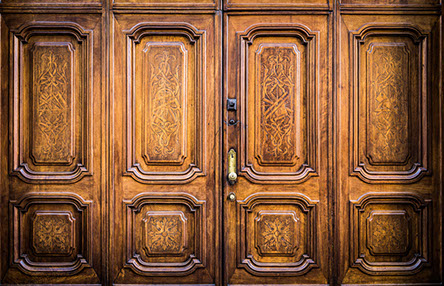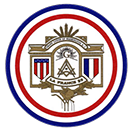
To You, Layman, my Brother, who knocks at our Door in the hope of becoming a Freemason… To start with, you need to know that, here, everything is symbolic. Thus, please understand that, if Freemasons are united by the bonds extant within a large Fraternity, they also extend this feeling to the whole of Humanity. Hence, I already call you “Brother,” because of what I hope will unite us in the future, but also in the name of human fraternity in general.
But what is this Masonic Fraternity?
First, it is a fellowship, a friendship between men whom we feel are fundamentally like us, although they may have very different characters and thinking processes. It is a friendship based on the basic equality that exists between all of us, in spite of some differences. This friendship, this love of and for the Other, is what the ancient Greeks referred to as αγάπη. This friendship is both a pleasure and a duty. It is a spontaneous affinity that extends to all Masons throughout the world. Layman, my Brother do you believe that you are capable of opening your heart, and offering your help to all, and not only to those that you will like, whatever their character, their religion, their race?

If you can’t see yourself doing that, then forget about Freemasonry. So, Freemasonry is a Fraternity. It is also a School. Although we have no doctrine and we are not dogmatic, our teachings are conveyed through the use of symbols, thereby allowing us the freedom to choose and to interpret, within some general but well-defined guidelines.
What you will eventually learn in Freemasonry will therefore depend on this instruction, conveyed to you by our rituals and our symbols, but will also depend on your personal qualities, and how you will apply yourself to accept these rituals and symbols, and integrate them in your daily life.
This is not the place to discuss the details of our work in Freemasonry. Suffice that you be aware that we are the spiritual heirs of those who, centuries ago, built all the cathedrals. Likewise, you will learn to build a Temple: this temple, ideal but very real nevertheless, will be that of your own life, part of that huge endeavor: Humanity.
If you really understand the Art of Freemasonry, you will live better, more fully and more soundly. Having become a better person, you will radiate this active virtue towards all those around you. This, of course, presumes that Humanity can be improved, albeit in small steps ! Without the hope that --slowly but surely-- Man does move towards a moral betterment, Freemasonry would be reduced to the level of a pleasant hobby.
But you can only join us, become one of us, after taking a giant step: initiation. Masonic Initiation is not similar to being received, or accepted, into some club, exclusive as it might be.
Initiation is, first of all, a thorough investigation of oneself, a willingness to commit oneself morally and, finally, a permanent transformation, a transmutation similar to that which the alchemists of old used to dream of, while they sought the philosopher’s stone.
To be Initiated means to enter a new world, to start a new life. You are still a Layman, waiting in front of the temple: an ignorant and impure profane. Profane, pro-fane, literally he who waits in front of the temple, that sacred and reserved area.
What do we expect of you, so that we may make of you a new man, a Freemason? We expect you to demonstrate three qualities: Wisdom, Strength and Enthusiasm.
Wisdom:
Wisdom, in the sense of being interested by and in everything that is related to the Human race, just as Terence, the Roman playwright wrote: "Homo sum, humani nil a me alienum puto," or "I am human, nothing that is human is alien to me."
What we are looking for is a desire to understand, to get to the truth while discarding those prejudices formed in your youth.
Wisdom is also the ability to control your passions, and be always moderate. Wisdom is also a form of tolerance, a certain ability, and willingness to listen to those arguments that may be diametrically opposed to your own way of thinking. As you will accept to listen to the opposite point of view, it goes without saying that the reverse will also be true, you will have the right to express and defend your own ideas, as long as these ideas are sincerely yours.
Strength:
Strength can be understood in the context of William of Orange’s motto: “Il n’est pas nécessaire d’espérer pour entreprendre, ni de réussir pour persévérer” or, “One need not hope in order to undertake; nor succeed in order to persevere.” Strength resides also in the refusal to be indifferent. Earlier, we mentioned the need for tolerance, but this tolerance must not be an excuse to accept stupid stubbornness, or worse, intellectual malignancy. Strength is also required to accept adversity and disillusion.
Enthusiasm:
Enthusiasm is what --during initiation-- will elevate the neophyte above banality, that level where laymen often wallow; it is that which transforms the neophyte’s spirit and instills an aspiration for all things good and beautiful, and embellishes our everyday reality.
We also hope to find in you a sense of the Divine. We are using this term in its symbolic sense: we do not expect you to believe in any particular God of a revealed religion, but in that all-powerful entity we refer to as The Great Architect of the Universe. The Wise knows he is surrounded by mystery, and that he functions within the confines of a universal order of laws that regulate the life of our universe.
A few additional details:
a) all our ceremonies involve an ancient symbolic ritual, derived from those of old initiatory societies and esoteric cults that go back to antiquity. In addition, our predecessors, the Operative Masons, have bequeathed us their symbolism of language and tools. To some, this may appear quaint and obsolete while, to us, it is rich in its multiple meanings.
b) we encourage modesty, but not to the point of humility, and we detest arrogance as it clashes with our sense of equality and brotherhood of man.
c) we also believe that patience is an absolute necessity to become a Mason. It is only very slowly that we are transformed into better Men by our Masonic work.
d) if we decide to accept you in Freemasonry, we will expect you to give a lot of yourself in this endeavor. Of you will be required lots of your time and personal work; a little of your money; a lot of your intelligence and knowledge; and enormously of your heart. It will be necessary for you to husband your efforts, so that your involvement in our Craft won’t be to the detriment of your personal and family life.
e) Finally, because we are optimists, we will expect you to be happy, but we will respect your occasional seriousness.
A word of warning: Freemasons are still men, with all their frailties. Hence, expect disillusion as you meet imperfection within our ranks. Then will be the time to reach for your own wisdom and wonder whether you yourself are not partly responsible; time to reach for your own strength to fight this discouragement that is, after all, only weakness on your part; and finally, time to reach for the enthusiasm you experienced and developed during your initiation: if you have become a real Freemason, this youthful enthusiasm will never wane.
Now, Layman and Brother, for you has come the time to meditate the content of this page. Our purpose is neither to recruit you, nor to discourage you. We are not showing you a rosy picture; work, and lots of it, will be required on your part.
Consider your own moral virtues and your intellectual qualities: are they up to the tests of freemasonry? And, above all, consider your character flaws, and decide whether you believe you will be able to conquer them.
When you are ready, download and fill in our petition.
Any question? Write to: secretary@lafrancelodge93.org
* * *
Adapted by André Kesteloot from a paper published in 1973 by “La Concorde Universelle”, Grande Loge de Belgique.
Get Connected!
External Links
The Grand Lodge of District of Columbia
Supreme Council 33°
